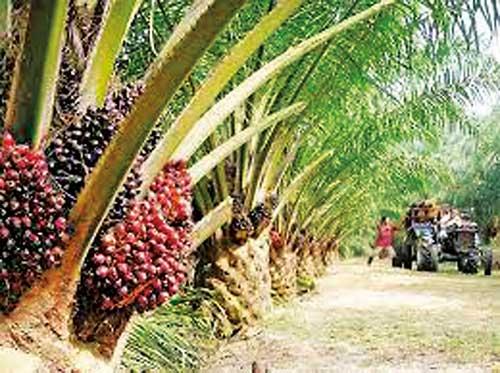23 Nov 2022 - {{hitsCtrl.values.hits}}
Sri Lanka is purposely ignoring the economic opportunities of oil palm cultivation, at a time when the rest of the world is strengthening economies through the cultivation of productive and economically important crops, such as oil palms.
world is strengthening economies through the cultivation of productive and economically important crops, such as oil palms.
The use of palm oil extends beyond cooking to the production of margarine, biscuits, sweets, bakery products and even other non-food products. However, while the annual consumption of vegetable oil in Sri Lanka is estimated to be around 250,000 tonnes, domestic production is only about 50,000 tonnes. As a result, Sri Lanka spends a huge amount of foreign currency on vegetable oil imports. Thus, if our annual vegetable oil requirement can be met through domestically produced palm oil, it is estimated that Sri Lanka can reduce its external spending by 27 to 44 million US dollars, each year.
However, unfortunately, the public does not have a clear understanding of oil palm cultivation, which has the highest yields among crops grown for vegetable oil. This is a result of the many myths and misconceptions about palm oil, which people sadly believe without bothering to do any research.
These unfounded and unscientific misconceptions have even led to a government ban on further oil palm cultivation, even though the global body of scientific research concerning it has empirically demonstrated that cultivation and consumption of palm oil poses no significant threat to the environment or public health.
 In fact, driven by scientific research, India, Malaysia, Indonesia and others have successfully and sustainably, expanded their palm oil production, with huge positive impacts accruing to their economies, particularly in rural areas. Additionally, in Sri Lanka at least, oil palm cultivation, by law, does not take place on virgin land and must occur on previously cultivated land. In fact, oil palms are a most suitable alternative to fields of rubber, tea and other crops that have begun to see yields dropping after decades.
In fact, driven by scientific research, India, Malaysia, Indonesia and others have successfully and sustainably, expanded their palm oil production, with huge positive impacts accruing to their economies, particularly in rural areas. Additionally, in Sri Lanka at least, oil palm cultivation, by law, does not take place on virgin land and must occur on previously cultivated land. In fact, oil palms are a most suitable alternative to fields of rubber, tea and other crops that have begun to see yields dropping after decades.
Thus, by increasing the production of palm oil, Sri Lanka can meet its vegetable oil needs at a lower cost. Furthermore, palm oil is required for a large number of manufacturing and industrial processes, often operated by SMEs. These businesses have repeatedly reiterated that substitutes to palm oil are economically unviable and result in decreased product quality and higher prices.
Considering the evidence supporting oil palm cultivation, it is indeed a pity that the government, not just refuses to support the industry but actively inhibits its growth and operation; without proper study, research or any heed to the growing, globally concurrent body of scientific and empirical evidence supporting the cultivation of oil palms, merely to appease certain groups of activists, driven no doubt by those with vested interests.
Any decision taken with regard to palm oil must, therefore, be backed by scientific evidence, logic and foresight. Particularly amidst the present economic difficulties, government policy should be supportive of oil palm cultivation.
Many pleas to reconsider the ban have been made to authorities, through various bodies, including the Ceylon Chamber of Commerce and the Palm Oil Industry Association of Sri Lanka, highlighting the high yields obtainable, as well as the potential for economic emancipation in rural areas, particularly through the diversification of cultivation away from solely large regional plantation companies and towards smallholders, which can truly strengthen rural communities and the national economy.
However, still, at present, the government stubbornly sticks to its ban on the expansion of cultivation, much to the detriment of Sri Lanka’s foreign exchange position, rural communities, SMEs, which make up the backbone of commerce and economic activity in Sri Lanka, and the national economy as a whole.
Today, every Sri Lankan is losing out as a result of this and many other, myopic, self-serving and grandstanding policy decisions taken to grow voter bases, rather than the economy. This must stop. It is now up to every Sri Lankan to call upon their leaders to pay heed to reason, empirical data, scientific evidence and expert advice, and repeal the ban on oil palm cultivation, while empowering the industry, so it can benefit all Sri Lankans!
(Manjula de Silva is Secretary General and CEO of the Ceylon Chamber of Commerce)
06 Nov 2024 19 minute ago
06 Nov 2024 2 hours ago
06 Nov 2024 2 hours ago
06 Nov 2024 3 hours ago
06 Nov 2024 4 hours ago